Armorial of Malaysia
This is a list of Malaysian coats of arms. Each of the thirteen States of Malaysia has their own coat of arms. In Malay, the coat of arms is called a jata.
National
| Arms | Date of adoption | Use | Description |
|---|---|---|---|
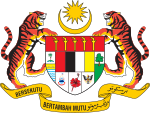 |
Used from 1988 after several modification in 1963, 1965, 1982 and 1988 | National coat of arms of Malaysia (Jata Negara) | Crest: Yellow crescent and yellow 14-pointed "federal star".
Shield: Equal divisions of four topped by single row of five krises, sided by a Pinang palm along with the Penang Bridge to the left and a Malacca tree to the right, and based on divisions containing the state arms of Sabah and Sarawak and a hibiscus (bunga raya) Supporters: Two rampant tigers proper. Motto: Bersekutu Bertambah Mutu (Unity is Strength) in Rumi (Latin) and Jawi scripts. |
 |
1963 | National coat of arms from 1963 to 1965 | The Federation of Malaysia arms in use between 1963 and 1965, with three new member states added to the bottom: Sabah, Singapore and Sarawak. |
States
| Arms | Date of adoption | Use | Description/Blazon |
|---|---|---|---|
 |
1870 | Coat of arms of Perlis | A green shield containing a yellow rice wreath and "Perlis" written in Jawi script, enveloped by a wreath of two green rice stalks. |
 |
1923 | Coat of arms of Kedah | A yellow shield containing "Negeri Kedah" (State of Kedah) written in Jawi, with a green crescent below, both enveloped by a wreath of two yellow rice stalks. |
 |
1988 | Coat of arms of Penang | Shield: Barry wavy of ten Azure and Argent upon a chief Or a depiction of the Penang Bridge Proper
Crest: On a wreath of the Colours upon a mount a Pinang or Areca-nut palm leaved and fructed Proper |
 |
1948 | Coat of arms of Perak | |
 |
1916 | Coat of arms of Kelantan | A star and crescent backed by pairs of spears, kris daggers and cannons, all of which are topped by a coronet, supported by a pair of muntjacs (kijang) and carries a scroll containing "Berserah Kepada Tuhan Kerajaan Kelantan" (Surrender to God The Kingdom of Kelantan) written in Jawi. |
 |
1932 | Coat of arms of Terengganu | A dotted seal containing a coronet, a sword, a long kris, two books and a scarf, with "Terengganu" written in Jawi at the bottom and topped by a star and crescent, all enveloped by an oval outline. |
 |
19-- | Coat of arms of Pahang | A spear head sided by two halves of text written in Jawi, backed by a pair of tusks and based on a scroll containing "Negeri Pahang" (State of Pahang) written in both Rumi and Jawi scripts. |
 |
19-- | Coat of arms of Selangor | |
 |
19-- | Coat of arms of Negeri Sembilan | A shield topped by a staff fronted by a red sword and red scabbard; the shield contains three diagonal bands of yellow, black and red, a scroll containing "Negeri Sembilan" written in Jawi that holds nine stalks of rice, and a nine-pointed star below. |
 |
1957 | Coat of arms of Malacca | A shield containing five krises, two bands of red and yellow, and a Malacca tree, all of which are topped by a star and crescent, supported by two chevrotains (pelanduk), and based on a scroll containing the motto "Bersatu Teguh" (Firmly United) written in both Rumi and Jawi, and "Melaka" in Rumi. |
 |
1860 | Coat of arms of Johor | A shield containing a star and crescent and four stars, topped by a coronet, supported by two tigers and based on a compartment and scroll containing "Kepada Allah Berserah" (To God We Surrender) written in Jawi. |
 |
1988–present | Coats of arms of Sarawak | A shield features a symbolic wing-spread rhinoceros hornbill (burung kenyalang) with the shield bearing the state flag on its chest.[1] The hornbill's wings have 13 feathers, which represent the states in Malaysia.[1] The Hibiscus represent the Malaysia's national flower which appears on the right and left sides of the bird's legs and the hornbill is perched on a banner bearing the words "Bersatu, Berusaha, Berbakti" (Unity, Effort, Service).[1] |
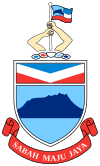 |
1988–present | Coat of arms of Sabah | The two arms carrying the Sabah flag represents unity and harmony among its multiracial citizens, while the silhouette of Mount Kinabalu in the shield represents the state of Sabah. The state motto, "Sabah Maju Jaya" (Onward, Sabah) is displayed at the bottom of the emblem. The five colours represent the five residencies of the state, as well as symbolising courage and determination (Red), purity and justice (White), peace and calm (Zircon blue), unity and prosperity (Icicle blue) and strength and harmony (Royal blue). |
 |
Emblem of Kuala Lumpur | ||
 |
Emblem of Labuan | ||
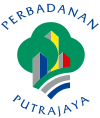 |
Emblem of Putrajaya |
Historical
| Arms | Date of adoption | Use | Description |
|---|---|---|---|
 |
1874—1946 | Coat of arms of the Straits Settlements | Shield: "Quarterly, the first quarter gules, issuant from the base a tower proper, on the battlements thereof a lion passant guardant Or; the second quarter argent, on a mount an areca nut palm tree proper; the third quarter also argent a sprig of the oil tree keruing proper; the fourth quarter azure in base on waves of the sea in front of a representation of the sun rising behind a mountain, a sailing yacht in full sail to the sinister, all proper."
Crest: "A demi-lion rampant guardant supporting in the paws a staff proper, thereon flying to the sinister a banner azure, charged with three imperial crowns." |

|
1896—1950 | Coat of arms of the Federated Malay States (1896—1946), the Malayan Union (1946—1948) and the Federation of Malaya (1948—1950) | Quarterly "party per cross" shield containing four segments coloured white, red, black and yellow, topped by a coronet, supported by two tigers and based on a scroll containing "Dipelihara Allah" written in Jawi. |
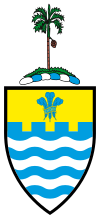 |
1949–1950 | Coat of arms of the Crown Colony of Penang from 1949 to 1950. | Shield: Barry wavy of eight Azure and Argent upon a chief crenellée Or a plume of three ostrich feathers surmounted by a riband of the First on the riband the words Ich Dien in letters of the Third.
Crest: On a wreath of the Colours upon a mount a Pinang or Areca-nut palm leaved and fructed Proper. |
 |
1950—1988 | Coat of arms of the Crown Colony of Penang from 1950 to 1957, also used for the state of Penang from 1957 to 1988. | The motto Bersatu dan Setia (Malay: "United and Loyal") was added beneath the shield in 1950. |
 |
1912-1946 | Coat of arms of the Crown Colony of Labuan | The badge was used from 1912 until 1946. |
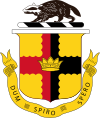 |
1841—1946 | Coat of arms of the Kingdom of Sarawak from 1841 to 1946 | The heraldic arms of the Brooke dynasty of the Raj of Sarawak based on the emblem used by James Brooke. |
 |
1946—1973 | Coat of arms of the Crown Colony of Sarawak from 1946 to 1963, also used for the state of Sarawak from 1963 to 1973 | The coat of arms is used from 1946 to 1963 by the British crown colony government in Sarawak. Continued to be used for the state of Sarawak from 1963 to 1973 after joining Malaya, Singapore, and Sabah (North Borneo) to form Malaysia. |
 |
1973—1988 | Coat of arms of the state of Sarawak from 1973 to 1988 | This coat of arms was used from 1973 to 1988 by the state of Sarawak. Its design serves as the basis for the state's current coat of arms and was the first to feature Rhinoceros Hornbill as the state emblem. Most of the elements of the emblem are similar to the current version, except for the "Trisakti" flag, then state flag of Sarawak on the shield and the motto Hidup Selalu Berkhidmat ("Live to serve"). |
 |
1882–1902 | Badge of British North Borneo | The badge was used from 1882 to 1902. |
 |
1902–1946 | Badge of British North Borneo | The badge was used from 1902 to 1946. |
 |
1948–1963 | Badge of British North Borneo | The badge was used from 1948 to 1963. |
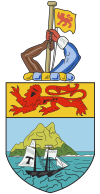 |
1948—1963 | Coat of arms of the Crown Colony of North Borneo from 1948 to 1963 | The coat of arms is used from 1948 to 1963 by the British crown colony government in North Borneo. |
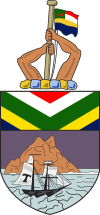 |
1963—1982 | Coat of arms of the state of Sabah from 1963 to 1982. | The coat of arms was used from 1963 to 1982 by the state of Sabah. |
 |
1982—1988 | Coat of arms of the state of Sabah from 1982 to 1988. | During this period, the Sabah state government choose to adopt a state coat of arms that resembled Sarawak's hornbill, as a memory of the two Borneo states' common history as vassal states of Brunei in the pre-British times. Sabah adopted a kingfisher because its indigenous Bajau sea gypsies, who are politically powerful in the state administration, and another powerful indigenous group, the Bruneians from Brunei, identify with the bird to a great extent. Both Bajaus and Bruneians were traditionally fishermen, and amongst Borneo natives, birds are considered messengers of the gods. The omen bird for the fishermen is the kingfisher. The majority native tribe, the interior-dwelling Kadazans or Dusuns, identify with the kingfisher to a lesser extent, as the bird is commonly found amongst their main occupational group, the rice farmers.[2] |
References and notes
- ^ a b c "The State Crest of Sarawak". Sarawak State Government. Archived from the original on 3 December 2013. Retrieved 23 November 2013.
- ^ Ian MacDonald. "Sabah (Malaysia)". CRW Flags. Archived from the original on 25 May 2016. Retrieved 25 May 2016.
